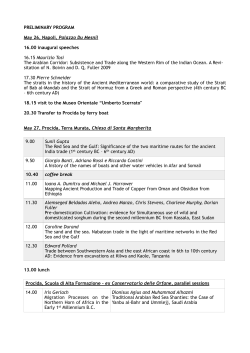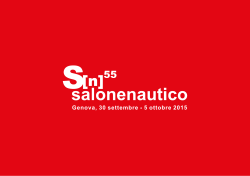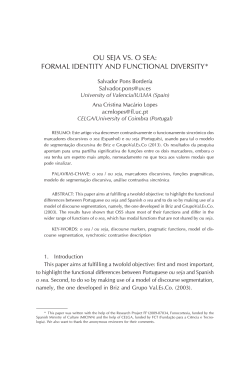
Black seaâunity and diversity in roman antiquity
The European Archaeologist – Issue 45 Summer 2015 Black sea−unity and diversity in roman antiquity compiled by Nona Palincaş, regional correspondent Romania (palincas@gmail.com) Main partners: Archaeological Museum of Thessaloniki (Greece), Regional Museum of History, Varna (Bulgaria), The Crimean Branch of the Institute of Archaeology, Sinferopol (Republic of Crimeea), Batumi Archaeological Museum, Batumi (Autonomous Republic of Adjara/Georgia), Free International University of Moldova, Chişinău (Republic of Moldova), Sinop Special Provincial Administration, Sinop (Turkey), Tulcea County Council (Romania), and a large number of associated partners, among which, for reasons of space, only those from countries not mentioned earlier are given here: the Fitzwilliam Museum in Cambridge (UK), Università di Bologna (Italy), Université de Provence, Aix-Marseille (France). Project manager: Vasilica Lungu (Romania); partner coordinator: Sergey Lantsov (Ukraine). Aims: Starting from the Roman antiquity as a common heritage of a large number of present day countries, the project (2013-2015) aims at creating a network of scientific, cultural and administrative institutions to promote the long terms interchange of scientific and cultural values in the area of the Black Sea Basin; cooperation in promoting of the Roman heritage in the Black Sea Basin; the raising of consciousness of the local communities and authorities with regard to the conservation and valorisation of the Roman heritage. Focus on: the establishing of a transnational association – The ‘Center for Roman Archaeological Heritage Studies in the Black Sea’ – in view of exchange of experiences, and the creation of a model of good practice for the protection and promotion of Roman heritage in the Black Sea region; assessment of the state of conservation and research of the common heritage in view of its scientific valorisation; the highlighting of cultural diversity of the region in Roman times as a model for discussing issues of globalization and local integration; and the creation of thematic itineraries of Roman archaeology for tourists. Funded by: the European Union through the Joint Operational Programme ‘BLACK SEA BASIN 2007-2013’. Website: http://www.bsudra.ro/en 36
© Copyright 2025





















